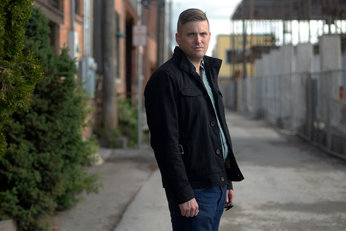|
Story by John Klingler '18
This school of thought justifies anger, bullying, and even violence as every interaction is swept up in a tidal wave of red or blue; after all, hasn’t the other side done worse? In this way, individual responsibility and morality are pushed aside in favor of partisan anger. A recent, high-profile example of this phenomenon continues to reverberate around my Facebook feed as friends repost the video of an unnamed man attacking Richard Spencer, poster-child for the Alt-Right. In the video, Spencer answers questions about his controversial views before an assailant swoops into the screen and lands a punch squarely on the side of Spencer’s face. This violence in support of political ideology is wrong, no matter how despicable Spencer’s views may be. Possibly more problematic, however, is the internet reaction to the video. In many facebook posts, the attacker is hailed as the hero who “punched a nazi”; indeed, #punchanazi still trends on twitter as the internet celebrates this assault. Just today, I saw the video remixed to the tune of New Order’s Bizarre Love Triangle. Few people, at least in my social circle, seem to be standing against this violence.
First, let me be clear: I believe that Richard Spencer is a despicable hate-monger. He has advocated for a “peaceful ethnic cleansing” in the United States; clearly this isn’t a man who earns sympathy in my book, nor is he an innocent victim. However, unprompted violence is certainly no way to respond to a political ideology built on hate. Instead, this casual celebration of an aggravated assault normalizes violence in pursuit of political gain. Once you justify an attack on Richard Spencer, is an attack on President Trump justified? What about an attack on an outspoken Trump supporter? Clearly, the answer to these questions is a firm “no”, but both can be justified by the same logic. Earlier this week, in fact, the rioting at UC Berkeley—in response to a speech by Milo Yiannopoulos—was justified under the same #punchanazi logic even though Yiannopoulos and Spencer advocate wildly different ideologies. The most frustrating part of this whole episode is that violence on the left plays into the narratives of both Richard Spencer and Milo Yiannopoulos. Spencer advocates for a white nation state and sees himself as the vanguard of a new era of white supremacy, and he justifies his views in part by arguing that his political opponents will stop at nothing to hurt him. To supporters of Richard Spencer’s white nationalism, the punch simply affirmed this belief, pushing them further toward hate. Yiannopoulos, on the other hand, travels from liberal university to liberal university on his “Dangerous F****t Tour” with the goal of provoking intense reactions, creating headlines, and furthering his brand. For him, the riots at UC Berkeley represent a major windfall. Clearly, violence is no way to counteract messages of hate in our society. Instead, intense (but civil) debate remains the only way to shut down an opposing view. To me, this is a valuable lesson for our Close Community in the midst of an increasingly divisive political climate. There are those in our community who continue sympathize with “punching a nazi,” labeling all trump supporters as “racist” or “bigoted”; civil decency, then, takes a backseat to hashtags and confirmation bias. If you want to make a difference, have a real conversation with someone who disagrees. If you stand firm in your beliefs, speaking with compassion and respect, then you may just change someone’s mind. Oh, and don’t repost that video.
0 Comments
Leave a Reply. |
